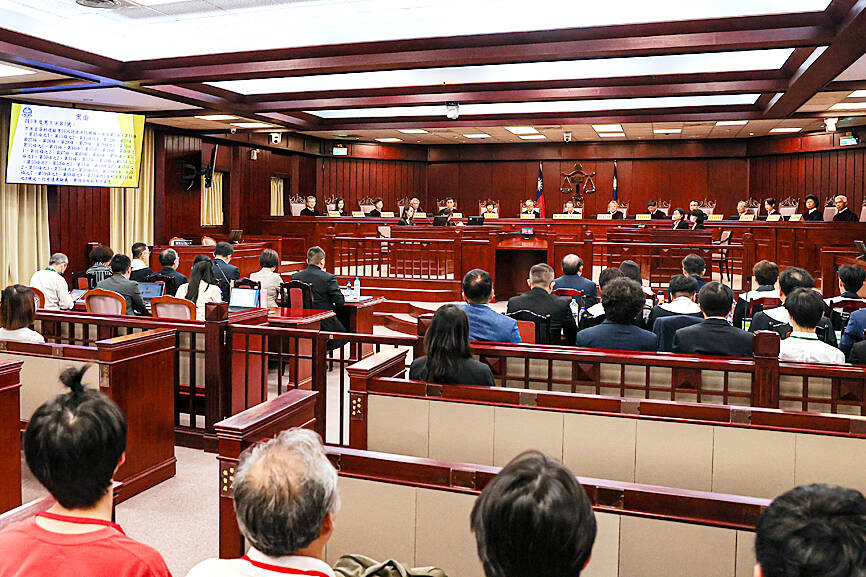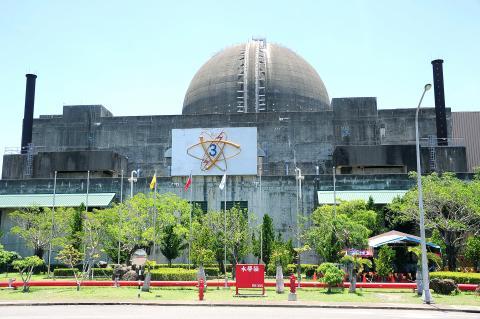Legal academics have called on the Constitutional Court to exercise restraint when reviewing a case about the constitutionality of amendments to government oversight laws passed by the Legislature at the end of May.
At a discussion on Friday co-hosted by the Republic of China Constitutional Law Society, attorney and Soochow University law professor Nigel Li (李念祖) said the legislature should be allowed sufficient latitude in crafting legislation.
A judicial ruling shackling the legislative body’s operations risks undermining the democratic system, Li said.

Photo: CNA
He was referring to the case brought by the Democratic Progressive Party (DPP) caucus, the Cabinet, President William Lai (賴清德) and the Control Yuan in a bid to reject oversight laws that took effect on June 26.
The Constitutional Court has already issued an injunction that halted enforcement of some of the revisions, including those that would have given legislators much broader investigative powers.
The amendments to the Act Governing the Legislative Yuan’s Power (立法院職權行使法) and the Criminal Code were pushed through by opposition Chinese Nationalist Party (KMT) and Taiwan People’s Party lawmakers, who together form a majority in the legislature.
The DPP-affiliated petitioners maintained that the deliberation that led up to the laws’ passage were unconstitutional, arguing that there was a lack of substantive discussions and that ruling party lawmakers were deprived of opportunities to express their views.
The petitioners also sought to challenge the constitutionality of many of the adopted measures, including those expanding the legislature’s investigative powers and requiring the president to address the legislature periodically and answer questions.
However, Li cited the court’s previous rulings, saying the court had in the past shown great respect for the “principle of legislative autonomy” provided that the legislative process did not contain “manifest and gross procedural flaws.”
The Constitutional Court, when trying to arbitrate constitutional disputes between top government agencies, as in the oversight law case, should refrain from assuming a “too active” role, he said.
Instead, the Constitutional Court should adopt a “minimalist” approach, he said, suggesting that the court render a ruling limited to the specific issues of the case and avoid setting broad precedents.
Political science professor Su Tzu-chiao (蘇子喬) and law professor Yang Chih-chieh (楊智傑) expressed similar views, saying the court should refrain from excessive intervention in the ongoing disputes between the opposition-led legislature and the petitioning agencies.
Su, also from Soochow University, said the new measures requiring the president’s presence at the legislature to deliver an annual state of the nation address and then answer questions would not undermine the constitutional system.
Rather, they would provide an opportunity to “clarify” the confusion in the division of responsibilities between the president and the premier, he said.
However, Lai has maintained that according to the Constitution, the president is not accountable to the Legislative Yuan and that the head of state can volunteer, but has no obligation, to address the legislature.
Friday’s discussion was cohosted by the National Policy Foundation — a think tank affiliated with the KMT — and the Taiwan Administrative Law Association.

A fugitive in a suspected cosmetic surgery fraud case today returned to Taiwan from Canada, after being wanted for six years. Internet celebrity Su Chen-tuan (蘇陳端), known as Lady Nai Nai (貴婦奈奈), and her former boyfriend, plastic surgeon Paul Huang (黃博健), allegedly defrauded clients and friends of about NT$1 billion (US$30.66 million). Su was put on a wanted list in 2019 when she lived in Toronto, Canada, after failing to respond to subpoenas and arrest warrants from the Taipei District Prosecutors’ Office. Su arrived at Taiwan Taoyuan International Airport at 5am today on an EVA Air flight accompanied by a

An essay competition jointly organized by a local writing society and a publisher affiliated with the Chinese Communist Party (CCP) might have contravened the Act Governing Relations Between the People of the Taiwan Area and the Mainland Area (臺灣地區與大陸地區人民關係條例), the Mainland Affairs Council (MAC) said on Thursday. “In this case, the partner organization is clearly an agency under the CCP’s Fujian Provincial Committee,” MAC Deputy Minister and spokesperson Liang Wen-chieh (梁文傑) said at a news briefing in Taipei. “It also involves bringing Taiwanese students to China with all-expenses-paid arrangements to attend award ceremonies and camps,” Liang said. Those two “characteristics” are typically sufficient

A magnitude 5.9 earthquake that struck about 33km off the coast of Hualien City was the "main shock" in a series of quakes in the area, with aftershocks expected over the next three days, the Central Weather Administration (CWA) said yesterday. Prior to the magnitude 5.9 quake shaking most of Taiwan at 6:53pm yesterday, six other earthquakes stronger than a magnitude of 4, starting with a magnitude 5.5 quake at 6:09pm, occurred in the area. CWA Seismological Center Director Wu Chien-fu (吳健富) confirmed that the quakes were all part of the same series and that the magnitude 5.5 temblor was

Restarting the No. 2 reactor at the Ma-anshan Nuclear Power Plant would take up to 18 months, Minister of Economic Affairs J.W. Kuo (郭智輝) said today. Kuo was answering questions during a meeting of the Legislative Yuan’s Economics Committee, where legislators are considering amendments to the Renewable Energy Development Act (再生能源發展條) amid concerns about the consequences of the Pingtung County reactor’s decommissioning scheduled for May 17. Its decommissioning is to mark the end of Taiwan’s nuclear power production. However, Chinese Nationalist Party (KMT) lawmakers have proposed an amendment to the Nuclear Reactor Facilities Regulation Act (核子反應器設施管制法) that would extend the life of existing